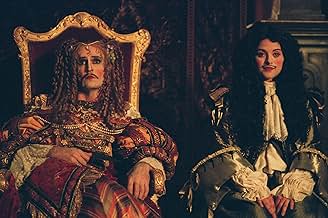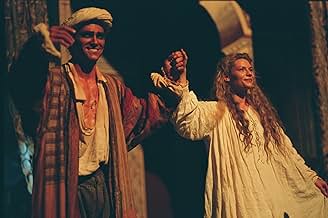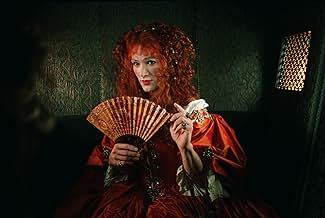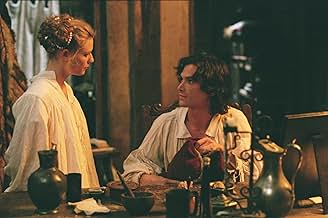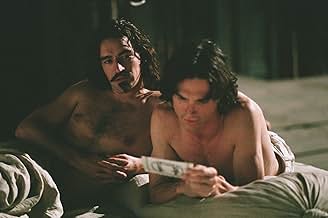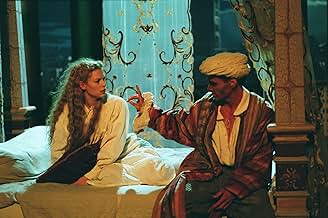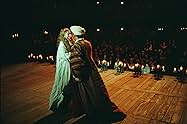CALIFICACIÓN DE IMDb
7.1/10
11 k
TU CALIFICACIÓN
Una vestuarista teatral provoca revuelo al interpretar a Desdémona en el Londres del siglo XVII, dejando dudas sobre el destino del actor que reemplazó.Una vestuarista teatral provoca revuelo al interpretar a Desdémona en el Londres del siglo XVII, dejando dudas sobre el destino del actor que reemplazó.Una vestuarista teatral provoca revuelo al interpretar a Desdémona en el Londres del siglo XVII, dejando dudas sobre el destino del actor que reemplazó.
- Premios
- 4 premios ganados y 1 nominación en total
Opiniones destacadas
Stage Beauty is another adaptation of a play. Yawn? Well don't, because it also happens to make a highly successful transition from stage to screen thanks to the genius that is director Richard Eyre.
It tells the tale of Ned (Billy Crudup), a young actor who specialises in portraying women on stage. In a world where only men are allowed to tread the boards, Ned's "Desdemona" (from Shakespeare's Othello) is the closest thing 17th century audiences get to femininity in theatre. However, a young upstart in the form of Maria (played by Clare Danes) wants to change all that. She has a passion for drama and unfortunately the bisexual Ned. With the help of King Charles II (Rupert Everett), she may just get her wish, changing theatre forever, and hopefully pick up Ned on the way.
When thinking of the themes of the film, many people dismiss it as a clone of Shakespeare in Love. This is unfair- the film is more thought provoking, substantial and better acted than the aforementioned Oscar snaffler. It explores themes of sexuality and gender with insight and intelligence as well as telling (and, in fact enthralling us with) a love story. As previously referred to, the acting is exceptional, especially the two leads (Danes and Crudup) who shine. The supporting cast is strong too, with Richard Griffiths as a heterosexual prequel to his role in Withnail and I, Tom Wilkinson brimming with quiet intensity as Betterton and Everett hamming it up wonderfully as the King.
Even if it does end on a slightly trite note (not to give too much away, but its' "birth of method acting" shtick irritates), Stage Beauty is a funny, heart-warming and occasionally quite cerebral meditation on love and art. What more could any theatre, or film lover for that matter, want? And don't say Shakespeare In Love!
It tells the tale of Ned (Billy Crudup), a young actor who specialises in portraying women on stage. In a world where only men are allowed to tread the boards, Ned's "Desdemona" (from Shakespeare's Othello) is the closest thing 17th century audiences get to femininity in theatre. However, a young upstart in the form of Maria (played by Clare Danes) wants to change all that. She has a passion for drama and unfortunately the bisexual Ned. With the help of King Charles II (Rupert Everett), she may just get her wish, changing theatre forever, and hopefully pick up Ned on the way.
When thinking of the themes of the film, many people dismiss it as a clone of Shakespeare in Love. This is unfair- the film is more thought provoking, substantial and better acted than the aforementioned Oscar snaffler. It explores themes of sexuality and gender with insight and intelligence as well as telling (and, in fact enthralling us with) a love story. As previously referred to, the acting is exceptional, especially the two leads (Danes and Crudup) who shine. The supporting cast is strong too, with Richard Griffiths as a heterosexual prequel to his role in Withnail and I, Tom Wilkinson brimming with quiet intensity as Betterton and Everett hamming it up wonderfully as the King.
Even if it does end on a slightly trite note (not to give too much away, but its' "birth of method acting" shtick irritates), Stage Beauty is a funny, heart-warming and occasionally quite cerebral meditation on love and art. What more could any theatre, or film lover for that matter, want? And don't say Shakespeare In Love!
He is exquisite, Billy Crudup I mean, but not as a woman. Strangely enough he is more feminine as a man than he is as a woman. Look at him in "Almost Famous" perfect. Shaped like a flamenco dancer, rhythmic, sexual, casually overpowering. In "Jesus's Son" just by waking up at the beginning of the film, he, his character, gets you. Here he seems at odds with the feminine aspect of his character. His Desdemona is a performance. What perhaps I'm saying is that I admired the performance but I didn't feel it. I was aware of its quality but I couldn't taste it, as I have done with previous Billy Crudup creations. Another strange thing, Clare Danes. I think she's one of the most interesting actresses of her generation and here you enjoy her enormously when she's on but her character is now a blurry dot in my memory. What remains most vividly in my mind is Rupert Everett's sensational turn as King Charles. All said and done, try not to miss it.
This movie has the blessing of the flawless direction of Richard Eyre, who knows a lot about kings and queens. The screen play is adapted by the author of the play, Jeffrey Hatcher. Surprisingly, these two men have been able to create a film that is not only visually satisfying, but it also is an adult entertainment.
This movie gives us a glimpse of how theatre functioned in England up to the times of Charles II. The female roles of all plays were portrayed by male actors. The school of acting in that era was an artificial one where actors relied in gestures and affectations that would be laughable today in a serious drama, but that was the way it was the accepted Method then, nothing to do with Stanivslaski, or Strassberg.
The leading figure of that theatrical world was Ned Keynaston, who was the most famous Desdemona of his time. There must have been a lot of gay men that were attracted to that world, as was the case with Mr. Keynaston, who might have been bisexual, although that comes as a secondary subplot. This actor is greatly admired by all, including the dressing assistant, Maria. This girl loved to be in the theatre, but could not, because only men were allowed. So instead, she goes to a second rate company that puts on plays in a pub and emerges as Margaret Hughes, an actress in her own right who will challenge Keynaston's Desdemona and makes that role, her signature role as well.
Claire Danes, as Maria, or Margaret Hughes, has never been better! She shines as the girl whose ambition is to be on stage. She is wonderful in the part. Ned, played with gusto by Billy Crudup, shows an unexpected range, although he has done theatre extensively. Both of these actors takes us back to London and make us believe that what we are watching.
A glorious English cast behind the two American principals are gathered to play effortlessly the theatrical figures of the time, and also the King and his court. Ruper Everett, as King Charles II, is hilarious. The scene in which he plays in drag with his mistress, Nell Gwynn, is one of the best things of the movie. Also, Richard Griffith, as lecherous Sir Charles Sedley, gives a stellar performance. Ben Chaplin, as the Duke of Buckingham, reveals the ambiguity of the men that were attracted to those early thespians.
Thoroughly enjoyable because of Richard Eyre's direction and eye for detail.
This movie gives us a glimpse of how theatre functioned in England up to the times of Charles II. The female roles of all plays were portrayed by male actors. The school of acting in that era was an artificial one where actors relied in gestures and affectations that would be laughable today in a serious drama, but that was the way it was the accepted Method then, nothing to do with Stanivslaski, or Strassberg.
The leading figure of that theatrical world was Ned Keynaston, who was the most famous Desdemona of his time. There must have been a lot of gay men that were attracted to that world, as was the case with Mr. Keynaston, who might have been bisexual, although that comes as a secondary subplot. This actor is greatly admired by all, including the dressing assistant, Maria. This girl loved to be in the theatre, but could not, because only men were allowed. So instead, she goes to a second rate company that puts on plays in a pub and emerges as Margaret Hughes, an actress in her own right who will challenge Keynaston's Desdemona and makes that role, her signature role as well.
Claire Danes, as Maria, or Margaret Hughes, has never been better! She shines as the girl whose ambition is to be on stage. She is wonderful in the part. Ned, played with gusto by Billy Crudup, shows an unexpected range, although he has done theatre extensively. Both of these actors takes us back to London and make us believe that what we are watching.
A glorious English cast behind the two American principals are gathered to play effortlessly the theatrical figures of the time, and also the King and his court. Ruper Everett, as King Charles II, is hilarious. The scene in which he plays in drag with his mistress, Nell Gwynn, is one of the best things of the movie. Also, Richard Griffith, as lecherous Sir Charles Sedley, gives a stellar performance. Ben Chaplin, as the Duke of Buckingham, reveals the ambiguity of the men that were attracted to those early thespians.
Thoroughly enjoyable because of Richard Eyre's direction and eye for detail.
I had heard of the film through tadbloid and celebrity headlines of how Billy Crudup left his seven month pregnant girlfriend, Mary-Louise Parker, for Claire Danes. I wasn't interested in the film, but then my sister got the DVD for her birthday. I saw it for the first time over the week and I have been watching it over and over again. What a beautifully written story about acting, gender, theater, illusion, romance, and discovery of one's own identity. During the Restoration of England under the reign of King Charles II, women were finally given the freedom and right to perform on the stage whereas before the decree it was illegal and obscene for a woman to perform on stage.
Ned Kynaston (Billy Crudup) is the greatest actor and the most beautiful "woman" of the English stage. He played several women's part and his most famous is the role of Desdemona in William Shakespeare's Othello. He is studied, admired, loved, and envied by his dress keeper, Maria (Claire Danes). She watches from the wings and longs to act and she does so behind Kynaston's back and in low pubs before a royal official, the Duke of Buckingham (Ben Chaplin). Then the chain of events unfold as Maria is introduced to Charles II (Rupert Everett) and his mistress Nell Gwyn (Zoe Tapper) who then declares that women will be given the freedom to perform in theater.
As Maria's fame rises and women are playing more and more of the female roles, Ned Kynaston (the last of his kind of actors) is casted aside. As an actor and as man, Kynaston had learned to suppress all masculinity in order to gain the grace and beauty of a woman. He knows only how to portray women and he is lost in learning to play male roles. But then again Maria is unable to play the role of Desdemona as a real woman. Both Kynaston and Maria fall in love and into passion as they learn from each other their own sexual identities and to channel their femininity and masculinity.
I fell in love with the film's story and with the performances of Billy Crudup and Claire Danes. As Kynaston, Crudup reveals vulnerability and strength as a man who discovers himself as a man (and a very hot one at that) through the role and eyes of being a woman. As Maria, Danes is beautiful and real: those tears are real! She can cry on cue and with the heartbreak of a real woman in love and envious of the man she loves. Maria is a strong, forthcoming, and in way a modern actress ahead of her time. She is not an "Eve" from All About Eve, she is a Viola Delesop from Shakespeare In Love, but real. The love scene between Danes and Crudup is sexy, tender, and passionate showing that explicit sex and nudity is not always necessary. They look into each other's sides and truly learn from each other as man and woman.
This is a highly recommended film for those who love acting, period pieces, or just if you want to see a really good film, "Stage Beauty" is very much the film to watch.
Ned Kynaston (Billy Crudup) is the greatest actor and the most beautiful "woman" of the English stage. He played several women's part and his most famous is the role of Desdemona in William Shakespeare's Othello. He is studied, admired, loved, and envied by his dress keeper, Maria (Claire Danes). She watches from the wings and longs to act and she does so behind Kynaston's back and in low pubs before a royal official, the Duke of Buckingham (Ben Chaplin). Then the chain of events unfold as Maria is introduced to Charles II (Rupert Everett) and his mistress Nell Gwyn (Zoe Tapper) who then declares that women will be given the freedom to perform in theater.
As Maria's fame rises and women are playing more and more of the female roles, Ned Kynaston (the last of his kind of actors) is casted aside. As an actor and as man, Kynaston had learned to suppress all masculinity in order to gain the grace and beauty of a woman. He knows only how to portray women and he is lost in learning to play male roles. But then again Maria is unable to play the role of Desdemona as a real woman. Both Kynaston and Maria fall in love and into passion as they learn from each other their own sexual identities and to channel their femininity and masculinity.
I fell in love with the film's story and with the performances of Billy Crudup and Claire Danes. As Kynaston, Crudup reveals vulnerability and strength as a man who discovers himself as a man (and a very hot one at that) through the role and eyes of being a woman. As Maria, Danes is beautiful and real: those tears are real! She can cry on cue and with the heartbreak of a real woman in love and envious of the man she loves. Maria is a strong, forthcoming, and in way a modern actress ahead of her time. She is not an "Eve" from All About Eve, she is a Viola Delesop from Shakespeare In Love, but real. The love scene between Danes and Crudup is sexy, tender, and passionate showing that explicit sex and nudity is not always necessary. They look into each other's sides and truly learn from each other as man and woman.
This is a highly recommended film for those who love acting, period pieces, or just if you want to see a really good film, "Stage Beauty" is very much the film to watch.
When the British make a costume drama it is simply a feast for the senses: Luminous colours in the most beautiful shades of red, gold and brown, costumes full of little details and precious jewelry and a great music score that takes you straight to Shakespearian and Bronte England. Now, a new precious jewel of the British cinema comes to film theatres and from my first impression it could be the best film of this year (well, at least until the new Harry Potter comes out).
The topic is more or less familiar from "Shakespeare in love": It is the drama of this time when women wanted to act on stage but only men were allowed to do so. While "Shakespeare in love" showed this drama from a female point of view, "Stage Beauty" deals with a man whose life falls to bits and peaces when a woman plays a woman and achieves a change of law which now allows women to act on stage.
Ned Kinaston (Billy Crudup) is a stage beauty, means: A male actor who is skilled in and specialized on strictly performing female roles. He had done so for years, can do it like no other and play nothing else. He is a star and the best stage beauty in London. Like every star, Ned has someone who cares for him, knows all his wishes on and behind the stage and holds his feet on earth: It is Maria (Claire Danes), the girl who cares for his wigs, his make-up and his costumes. Maria does not only love Ned, she lives for the theatre and dreams to be on stage herself. One night she "borrows" Ned's costumes and wig and makes her dream illegally come true on a little stage. She is a full success and so sets the wheels in motion: A duke has seen her performance, a duke who has connections to the king and soon the law is changed: Women are allowed to act on stage now. Kinaston sees the end of his career and drowns in despair. But it is Maria again who might save him.
A fascinating tale about men in dresses, women in tights and the theatre in Shakespearean England. But "Stage Beauty" is so much more. It is about two people whose heart belongs to the theatre and who are so deep into it that reality and fiction is sometimes a dangerous mix. It is about a man and a woman who find their way in a time where this way seems not to exist. It is dramatic, sometimes wonderfully romantic and fragile, very entertaining and simply beautiful.
Hands down for Billy Crudup's performance: This beautiful man is not bad as a woman, but basically the film celebrates his male beauty. When he is on stage he's incredible and when he's off stage he's simply hot but also convincing when facing the greatest crisis of his life (in his role I mean). But actually the person carrying the film is a fantastic Claire Danes. Once again she is playing Shakespeare, this time not Julia but Desdemona. She is strong, she is beautiful, she is courageous but also sympathetic. The supporting cast is what every director and viewer can only dream of: It includes Tom Wilkinson, Rupert Everett, Hugh Bonneville and Ben Chaplin.
If you haven't seen this film yet, do so, it's a great experiences. It enchants, it gives your dreams wings, hope and strength. And is great entertainment, too.
The topic is more or less familiar from "Shakespeare in love": It is the drama of this time when women wanted to act on stage but only men were allowed to do so. While "Shakespeare in love" showed this drama from a female point of view, "Stage Beauty" deals with a man whose life falls to bits and peaces when a woman plays a woman and achieves a change of law which now allows women to act on stage.
Ned Kinaston (Billy Crudup) is a stage beauty, means: A male actor who is skilled in and specialized on strictly performing female roles. He had done so for years, can do it like no other and play nothing else. He is a star and the best stage beauty in London. Like every star, Ned has someone who cares for him, knows all his wishes on and behind the stage and holds his feet on earth: It is Maria (Claire Danes), the girl who cares for his wigs, his make-up and his costumes. Maria does not only love Ned, she lives for the theatre and dreams to be on stage herself. One night she "borrows" Ned's costumes and wig and makes her dream illegally come true on a little stage. She is a full success and so sets the wheels in motion: A duke has seen her performance, a duke who has connections to the king and soon the law is changed: Women are allowed to act on stage now. Kinaston sees the end of his career and drowns in despair. But it is Maria again who might save him.
A fascinating tale about men in dresses, women in tights and the theatre in Shakespearean England. But "Stage Beauty" is so much more. It is about two people whose heart belongs to the theatre and who are so deep into it that reality and fiction is sometimes a dangerous mix. It is about a man and a woman who find their way in a time where this way seems not to exist. It is dramatic, sometimes wonderfully romantic and fragile, very entertaining and simply beautiful.
Hands down for Billy Crudup's performance: This beautiful man is not bad as a woman, but basically the film celebrates his male beauty. When he is on stage he's incredible and when he's off stage he's simply hot but also convincing when facing the greatest crisis of his life (in his role I mean). But actually the person carrying the film is a fantastic Claire Danes. Once again she is playing Shakespeare, this time not Julia but Desdemona. She is strong, she is beautiful, she is courageous but also sympathetic. The supporting cast is what every director and viewer can only dream of: It includes Tom Wilkinson, Rupert Everett, Hugh Bonneville and Ben Chaplin.
If you haven't seen this film yet, do so, it's a great experiences. It enchants, it gives your dreams wings, hope and strength. And is great entertainment, too.
¿Sabías que…?
- TriviaClaire Danes and Billy Crudup became a couple after the filming of this movie. Crudup left his long-time girlfriend Mary-Louise Parker for Danes.
- ErroresNed Kynaston, age 20-something, says that he's been playing women on stage for half his life, since he was a child. But at the royal banquet, the King says that the theatres have only recently reopened after an 18-year shutdown caused by the Puritan takeover.
- Citas
King Charles II: Why shouldn't we have women on stage? After all, the French have been doing it for years.
Sir Edward Hyde: Whenever we're about to do something truly horrible, we always say that the French have been doing it for years.
Selecciones populares
Inicia sesión para calificar y agrega a la lista de videos para obtener recomendaciones personalizadas
- How long is Stage Beauty?Con tecnología de Alexa
Detalles
- Fecha de lanzamiento
- Países de origen
- Sitios oficiales
- Idioma
- También se conoce como
- Compleat Female Stage Beauty
- Locaciones de filmación
- Productoras
- Ver más créditos de la compañía en IMDbPro
Taquilla
- Total en EE. UU. y Canadá
- USD 782,383
- Fin de semana de estreno en EE. UU. y Canadá
- USD 38,654
- 10 oct 2004
- Total a nivel mundial
- USD 2,307,092
- Tiempo de ejecución1 hora 46 minutos
- Mezcla de sonido
- Relación de aspecto
- 2.35 : 1
Contribuir a esta página
Sugiere una edición o agrega el contenido que falta

Principales brechas de datos
What is the Spanish language plot outline for Stage Beauty (2004)?
Responda


